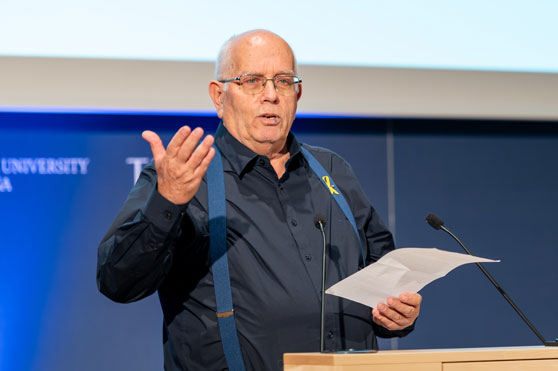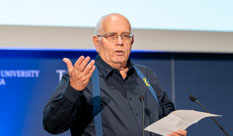More:
News & Stories
“Never Again”: Standing Up Against Antisemitism in Medicine
Prof. Shmuel Reis helps create a roadmap for integrating important lessons learned from Nazi medical atrocities into contemporary medical and health science curriculums worldwide

Prof. Shmuel Reis
As a co-chair of the prestigious Lancet Commission on Medicine, Nazism, and the Holocaust, established in 2021 by the acclaimed British medical journal, Prof. Shmuel Reis of the HIT Digital Medical Technologies Department, together with a team of 19 international colleagues, set out to shape an ethically driven educational paradigm for modern health science and medical education. The purpose: to train a current and new generation of “morally conscious, self-critical and resilient professionals” who are capable of upholding human values in the face of changing political and social tides. The Commission worked for almost three years, with often weekly ZOOM meetings, met twice in Jerusalem and Vienna, and launched its report last November in Vienna and Berlin. The report and additional materials were published on Nov 8, 2023.
Since established on Jan 23, 2021, the Commission has conducted an in-depth historic review of the facilitating role that health professionals played in “formulating, supporting, and implementing inhumane and often genocidal policies.” These dogmatic policies were based on the major tenets of Nazism and its service to the racist and antisemitic principles of the regime: systematic exclusion and persecution of Jewish health professionals, Nazi ideology, eugenics, and medical genetics, forced sterilization and abortions, and medicalized mass murder.
The insight gained from this expansive review starkly highlighted not only the moral vacuum and bankruptcy of the medical profession during the Nazi reign (it was revealed that the medical establishment was actively complicit in Nazis’ health policies) and the fragility of medical values and ethics, but more importantly, the potential dangers that exist in times of social, political, cultural and economic changes, whether in Germany during WWII, Ruanda, Ukraine, Syria, Yemen, Israel or Gaza.
The report also highlights the acts of resistance and sacrifice of many Jewish and non-Jewish health professionals who fulfilled their professional oath under impossible circumstances. Examples include patient care, and education (a clandestine medical school in the Warsaw Ghetto and the hunger disease study in the same Ghetto).
The Commission recommended, among many other suggestions, that Medicine, Nazism, and the Holocaust be a mandatory component of the health science curriculum.
Members felt that only by understanding and learning about the horrific excesses of these times and placing them within a medical context, as well as getting to know the inspiring examples that demonstrated ethical triumph over adversity, could health professionals develop the ethos, core values, and professional responsibility of care which define them throughout their careers. Moreover, it was deemed critical to provide health and medical students with the tools required to build resistance and resilience in the face of antisemitism, racism, and other discrimination.
According to Prof. Reis, “The Holocaust was the worst-case scenario of medicine, with wide-ranging implications about the moral behavior and abuse of power of physicians. This led to the current ethical code of medicine, which was drafted based on the lessons learned from this grievous historic period. Moral challenges today are dramatically on the rise and are predicted to grow exponentially. Learning about the collapse of medical ethics during the Holocaust is the most effective tool we have for preparing health professionals to meet these complicated issues with resilience and resolve. “
Ultimately, an educational model focusing on the formation of a professional identity based on medical history, which used the atrocities of the Nazi medical community as the frame of reference and point of departure was essential to achieve the core values of medicine.
According to Prof. Reis, “The identity of the physician, above and beyond knowledge and skills, should embody the core values of medicine: altruism, excellence, empathy, and compassion. The history of medicine, particularly the Holocaust era, needs to be incorporated into the identity of budding medical professionals so that the inherent moral dangers in the profession are recognized and pitfalls actively avoided.” In Israel, only four medical schools and three nursing schools offer courses on Nazism and the Holocaust.
The Commission is now very active in disseminating and implementing its recommendations. An online course on MNH for the African context was launched this week with Prof Reis as one of the course leaders. The report will be launched in June in Israel and a Faculty Development course for teachers of MNH has been initiated. Additional activities are conducted to make MNH required in all health professions education facilities in Israel. A similar international course is already underway since November and will run for a year.
Prof. Shmuel Reis specializes in family medicine and is one of Israel’s foremost experts in medical education, joined HIT’s Department of Digital Medical Technologies in 2021 . He was formerly a faculty member in Medical Education at the Technion (Rappaport Faculty of Medicine); Azrieli Faculty of Medicine in the Galilee and more recently at the Hebrew University, where he was in charge of the Center for Medical Education.
His commitment to incorporating the heinous history of Nazism and the Holocaust into contemporary medical education can be seen in his many scholarly publications, professional advocacy efforts, and singular contribution to Holocaust medical curriculum development. It is evident at HIT, where he offers an elective a MOOC on the subject (developed at Hebrew U), and is working with the Department to incorporate it within its curriculum.
For Prof. Reis, “Never Again” is not just a mantra. It is the driving force in his quest to ensure that this dark medical history is never repeated again.
The Commission’s work coincided with the Oct 7th Black Sabbath in Israel and the war in Gaza, accompanied by fake news campaigns and frightening rise in antisemitism. The Commission issued a firm statement of condemnation of the Hamas atrocities and some members continue to actively participate in the fight against related disinformation.
Posted: 22/02/2023
- News & Events
New Collaboration with Sheba Medical Center will qualify nurses to work in a digital environment.
Collaboration between HIT Holon Institute of Technology, the teaching authority of the Sheba Medical Center, and the Sheba-BEYOND virtual hospital will allow training nurses in Israel and around the world to work in a digital...



 Additional programs
Additional programs
